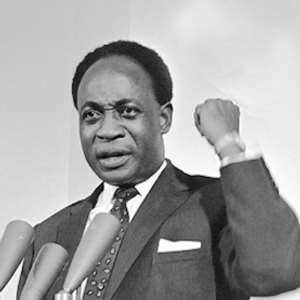
When Ghana gained independence, Nkrumah passed a law called the Avoidance of Discrimination Act, 1957 (No. 38) that illegalized political parties based on race, religion, region or ethnicity. The long title of the Act was An Act to prohibit organisations using or engaging in tribal, regional, racial and religious propaganda to the detriment of any community or securing the election of persons on account of their tribal, regional or religious affiliations and for other purpose connected therewith.
Section 4 (1) of the Act prohibited political parties from using religious or communal or ethnic symbols as party symbol or logo. Accordingly, Section 10 (1) of the Act provided penalties for persons or organisations that breached any provisions of the Act. Regarding the penalties for offenders, Section 10 (1) of the Act partly states, “the offender is liable upon conviction to a fine not exceeding seven hundred and fifty penalty units or to a term of imprisonment not exceeding three years or to both the fine and the imprisonment.”
The punitive mechanism under the law was the exact Nkrumah weapon designed to kill the monster of tribal politics in Ghana. It appears, however, that Nkrumah did not cut the head of the monster before his overthrow on 24th February 1966 so the monster has resurrected with dangerous tentacles in politics in Ghana today.
The foregoing notwithstanding, the Avoidance of Discrimination Act compelled the numerous ethnoreligious political parties to amalgamate under one umbrella called the United Party (UP), with the NLM and Northern People’s Party members assuming leadership roles and dominating the UP. It would be recalled from episode 1 that the ethnoreligious political parties were National Liberation Movement (NLM), Northern People’s Party (NPP), Anlo Youth Organisation (AYO), Moslem Association Party (MAP), Ga Shifimo Kpee and the Togoland Congress.
However, the demise of the UP came as a result of the National Assembly passing a resolution in September 1962, calling for Ghana to be declared a one-party State. Note that the CPP occupied 72 (about 67%) of the 108 seats in the National Assembly at the time. In a referendum held in January 1964, the resolution for a one-party State was adopted by the people. Accordingly, Article 1 of the 1960 Constitution was amended by inserting Article 1A (1) and 1A (2), thereby making room for only one political party in Ghana called Convention People’s Party. Article 7 of the 1960 Constitution was equally amended, changing the colours of the Ghana Flag from the original red, gold and green stripes with a black on the gold stripe to red, white and green stripes with a black star on the white stripe. This change thereby imposed the official colours of the CPP flag as the national flag. This was used from 19964 to 19966. The country resumed using the original flag after Nkrumah’s overthrow.
Conclusion
Even though Nkrumah waged war against the monster of tribal politics in Ghana through the use of the Avoidance of Discrimination Act, the monster still exists in partisan politics in Ghana today championed by the Akan dominated New Patriotic Party (NPP) and the Ewe dominated National Democratic Congress (NDC). These two political parties have over polarised the country such that even a neutral voice is treated as a partisan political voice. Sadly, the sound and spelling of people’s surnames deny them a governmental job depending on which political party is in power.
The monster of tribal politics with its poisonous tentacles may remain a stark reality in Ghana politics for many years to come. The monster catches secondary and tertiary students and makes them agents. This, therefore, increases the lifespan of the monster so it appears to last for so many years to come. The monster makes people especially the youth to engage in violent acts. In the 2020 general election, for example, some Ghanaians lost their lives due to motivation of the monster in diverse ways. Perhaps it is about time we all fought the monster and drove it away from our partisan political lives. May God help Ghana to do so.
~Asante Sana ~
Author: Philip Afeti Korto
Email: [email protected]




 'It’s absolutely false' - KMA clarifies report on missing GH¢3 million
'It’s absolutely false' - KMA clarifies report on missing GH¢3 million
 ‘I’ve consistently shamed my critics by fulfilling all promises made to Ghanaian...
‘I’ve consistently shamed my critics by fulfilling all promises made to Ghanaian...
 Election 2024: Live up to the task — Sheikh Aremeyaw to media
Election 2024: Live up to the task — Sheikh Aremeyaw to media
 GES gets clearance to recruit 2022 batch of degree holders from Colleges of Educ...
GES gets clearance to recruit 2022 batch of degree holders from Colleges of Educ...
 Bawumia given overwhelming endorsement in Bono East
Bawumia given overwhelming endorsement in Bono East
 Aviation sector has fully recovered from covid-19 disruption – Akufo-Addo
Aviation sector has fully recovered from covid-19 disruption – Akufo-Addo
 Bank of Ghana to address concerns of illegal MoMo charges
Bank of Ghana to address concerns of illegal MoMo charges
 "It's a shame" — Dr Lawrence Tetteh condemns galamsey
"It's a shame" — Dr Lawrence Tetteh condemns galamsey
